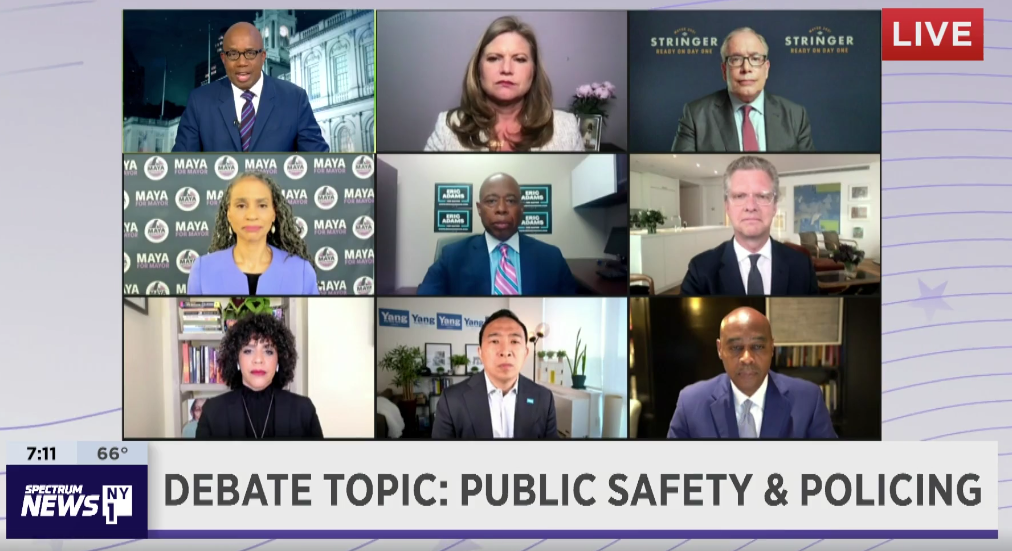The first official Democratic primary debate on Thursday night was a solid if stolid introduction to the platforms of the top eight candidates — in other words, it was almost indistinguishable from the dozens of forums the gang joined on Zoom over the past several months.
With many voters still undecided less than six weeks until primary day, perhaps that is not a bad thing. But a remote debate makes it nearly impossible for an organic argument to break out — the kind where flesh-and-blood humans all on the same stage can show poise and spontaneity, and eyes can't dart across laptop teleprompters with talking points. Both formats are performances, but one of them is a lot more engaging.
The debate centered on topics that moderators Errol Louis, Brian Lehrer and Josefa Velasquez rightfully deemed as important — policing, homelessness, the economy, and education — but Streetsblog readers can be forgiven if they tuned out: the word "transportation" was not uttered once. Certainly, there was talk about public health (but not the rarely discussed public health epidemic that leaves tens of thousands of New Yorkers injured every year by car drivers); talk of crime (but not the theft of 12 Central Parks worth of public space by a minority of New Yorkers who use it for vehicle storage); and plenty of discussion of moving issues (but nothing about moving people on transit).
And no one was even asked how he or she would address the climate crisis as mayor (OK, there was a composting question, with everyone but Andrew Yang supporting a citywide expansion).
Facing questions over his willingness to participate in local politics in the past, @AndrewYang claims he helped swing the Senate to Democrats by campaigning in Georgia.
— Spectrum News NY1 (@NY1) May 14, 2021
“That’s appalling,” @ericadamsfornyc interjects. Listen to the exchange here. #NY1politics #nycvotes pic.twitter.com/pM1RCEVrkp
Some of the best moments of the two-hour event came when candidates were allowed to cross-examine each other.
Dianne Morales, who has pledged to take $3 billion of the NYPD's budget and redistribute it to underserved communities and social services, asked Brooklyn Borough President (and former NYPD captain) Eric Adams why he said that "young white affluent people" are behind the "defund the police" movement.
"What do you say to the Black organizers ... who have in fact been leading this movement for decades? What do you say to them about how your statement erases their work and removes them from having a voice in the moment?" Morales asked.
"It was the disband movement, not the defund movement," Adams explained, not very convincingly. ("What’s the disband movement?" Morales replied.)
Adams, who is running close to Yang according to polls, was asked by civil rights attorney and former de Blasio counsel Maya Wiley why he expressed support for stop-and-frisk as recently as a few months ago.
"It really just shows your failure of understanding law enforcement," Adams said, his voice a monotone of disdain.
"I was the chair of the Civilian Complaint Review Board, I understand misconduct," Wiley retorted.
"We both know how much it was a failure under you," Adams shot back.
Mayoral candidate @ShaunDonovanNYC comes out swinging at two frontrunners:
— Spectrum News NY1 (@NY1) May 14, 2021
About @AndrewYang, he said, “This is not time for a rookie as mayor.” He also criticized @ericadamsfornyc over statements that he’d carry a gun on him as mayor.#NY1politics #nycvotes pic.twitter.com/Qhj4bXPuPA
Former banker Ray McGuire asked Yang if he regretted telling members of his tech job startup that their program "might simply not be the best fit for black applicants," as the Times reported.
Yang initially played it off as "a hypothetical where I was posing it to my team in order to challenge our thinking."
After more pressing from McGuire, Yang said, "I actually don't even remember saying that, but if you say that it's documented somewhere. ... But I genuinely don't remember saying that statement." (This was the second time Yang's memory failed him during the debate, after he couldn't be quite sure whether he voted in the 2000 presidential election.)
When asked if his father's $3-million donation to a SuperPAC supporting his candidacy was appropriate, Shaun Donovan pointed out "there were dozens of these groups supporting Scott Stringer when he was running for comptroller in 2013."
"Don’t get me involved in your daddy’s problems," Stringer said, in a debate in which he mostly laid low and appeared tired.
Another highlight was the lightning round questions that required candidates to give specific answers. Adams and Stringer were the only mayoral hopefuls who said they wanted a full-time remote option for public school students in the fall. Garcia and Adams said they would keep the specialized high school test (also known as the SHSAT) as the only criteria to get into the elite high schools. Every candidate agreed that NYPD officers should be required by law to live in New York City and that body camera footage should be released immediately when the police kill someone. Every candidate but McGuire pledged to hire a police commissioner from outside the NYPD.
Stringer, Wiley, and Morales were the only candidates who said they would not flood the MTA with more police officers.
What one regulation would the candidates remove to help small businesses?
Adams and Wiley both said improper signage; Donovan mentioned lingering COVID restrictions, McGuire said "regulations having to do with building outdoor restaurants."
Garcia said she'd do away with surprise restaurant inspections, Stringer wanted to lift some DOB regulations, and Yang wanted to cap delivery fees for restaurants. Morales said she wanted to insure that Arab-owned businesses get benefits as minority and women-owned businesses, a classification they currently lack.
You can watch the whole debate here. The next Democratic debate is on Wednesday, June 2. If someone at the Campaign Finance Board is reading this: can it please be in person, and outside? Maybe on one of those new Open Boulevard restaurant streets?






